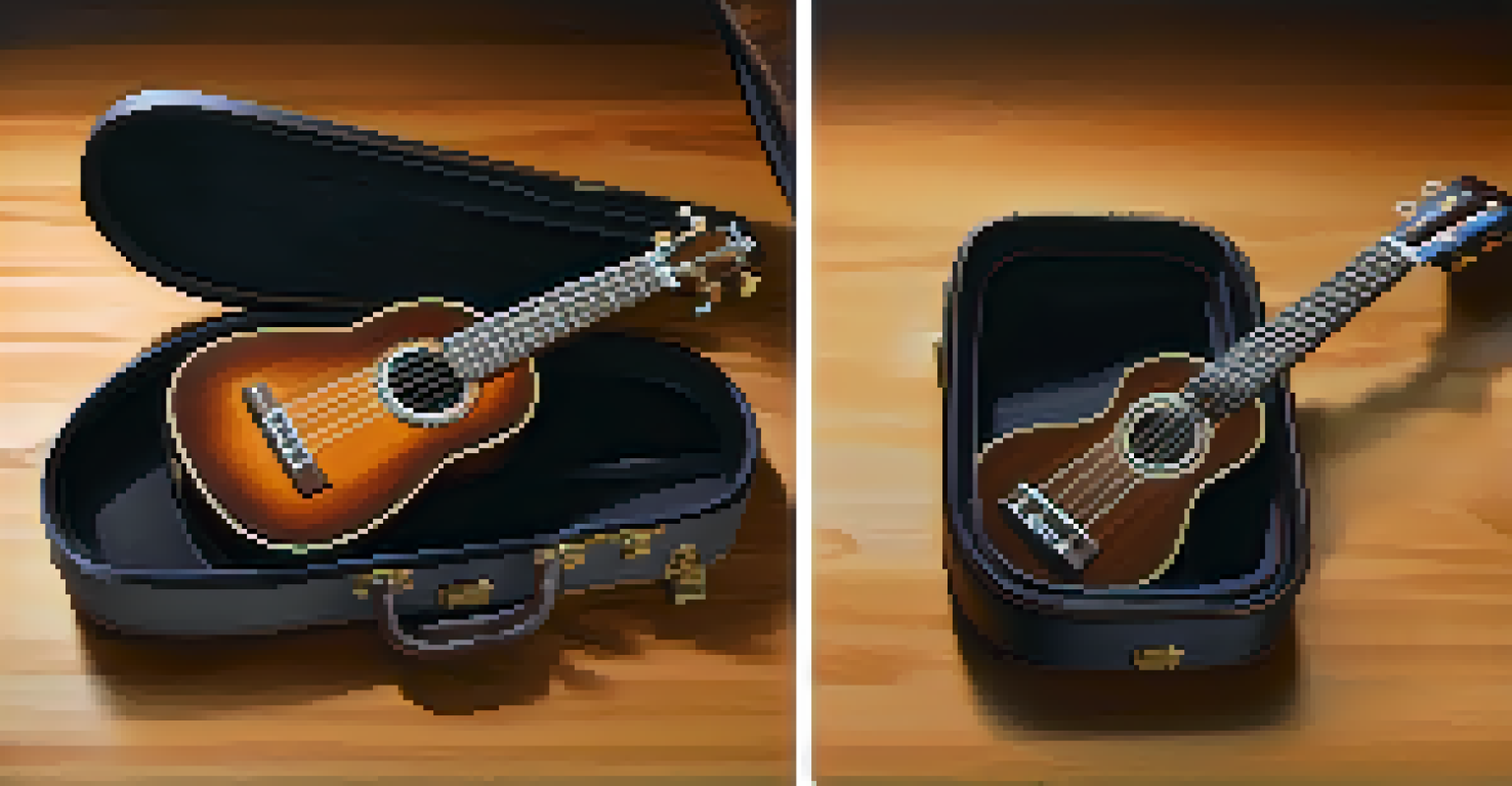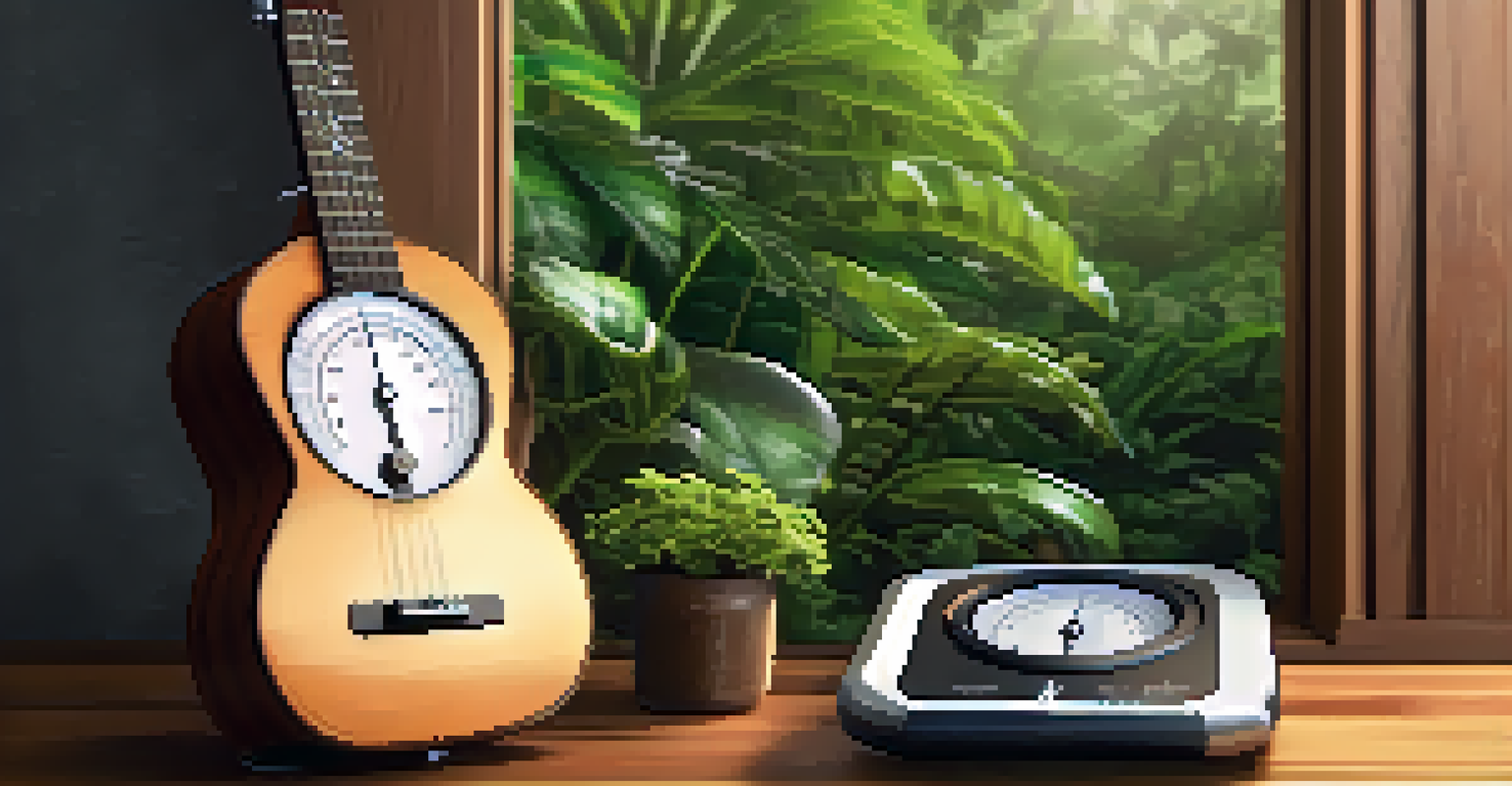How to Store Your Ukulele: Tips for Long-term Care

Choosing the Right Storage Location for Your Ukulele
The first step in ensuring your ukulele's longevity is selecting an appropriate storage location. Ideally, you want a place that is dry, stable in temperature, and away from direct sunlight. Excess heat can warp the wood, while humidity can lead to mold growth.
Take care of your instrument, and it will take care of you.
Consider a soft case or gig bag for portability, but for long-term storage, a hard case is highly recommended. This provides better protection against accidental bumps and environmental changes. Think of it as a cozy home for your instrument when it's not being played.
If you have a designated music space, ensure it’s well-ventilated and free from dust. Just like you wouldn’t leave your favorite book in a damp basement, your ukulele deserves a safe and clean environment to thrive.
Temperature and Humidity: The Perfect Balance
Maintaining the right temperature and humidity levels is crucial for your ukulele's health. Ideally, you should aim for a temperature between 65°F and 75°F (18°C to 24°C) and humidity levels around 45% to 55%. Think of it as creating a comfortable climate for your instrument.

Using a hygrometer can help you monitor the humidity in the room where your ukulele is stored. If you live in a particularly dry or humid area, consider investing in a humidifier or dehumidifier. This small investment can save you from costly repairs down the line.
Choose the Right Storage Location
Selecting a dry, temperature-stable area away from sunlight is vital for your ukulele's longevity.
Another helpful tip is to keep your ukulele away from heating vents, air conditioners, or drafty windows. Just as you would avoid extreme weather conditions yourself, your ukulele will fare better in a stable environment.
Cleaning and Preparing Your Ukulele for Storage
Before tucking your ukulele away for a long period, it's essential to give it a good cleaning. Dust and grime can build up, affecting both sound quality and the wood's finish. Use a soft, dry cloth to wipe down the body and strings carefully.
The best way to preserve your instrument is to treat it like a part of your family.
For a deeper clean, consider using a specialized ukulele cleaner or polish. Just a little goes a long way, and it can help protect the wood from moisture. Think of it like giving your instrument a refreshing spa day!
Additionally, loosen the strings slightly before storing your ukulele. This reduces tension on the neck and body, which can help prevent warping or cracking. It's a simple step, but one that makes a big difference in the long run.
Using Proper Supports: Stands vs. Wall Hangers
When it comes to storing your ukulele, how you display it matters. A sturdy stand can be a great option for easy access while keeping your instrument safe. Just ensure it's designed for ukuleles, as some stands may not support the unique shape.
Alternatively, wall hangers can save space and add a decorative touch to your room. However, it's crucial to install them securely to avoid accidents. Imagine your ukulele hanging proudly on the wall, like a piece of art, while also being safely stored!
Maintain Ideal Temperature and Humidity
Keeping your ukulele in a climate between 65°F to 75°F and 45% to 55% humidity helps prevent damage.
Regardless of your choice, make sure the support you use is stable. A toppled ukulele can lead to scratches or even more severe damage, so always prioritize safety when displaying your cherished instrument.
The Importance of Regular Check-ups and Maintenance
Just like a car needs regular maintenance, your ukulele benefits from occasional check-ups. Even when stored, it’s good practice to take it out and inspect it every few months. Look for any signs of wear or damage, such as cracks, scratches, or loose parts.
During these check-ups, consider changing the strings if they feel dull or lifeless. Fresh strings can bring back that bright, resonant sound we all love. It’s like treating yourself to a new pair of shoes; everything feels better when it’s fresh and clean!
If you notice any issues during your inspection, don’t hesitate to consult a professional. A luthier can offer repairs or adjustments that will keep your ukulele in top shape for years to come.
Avoiding Common Mistakes in Ukulele Storage
There are a few common pitfalls when it comes to ukulele storage that you’ll want to avoid. For example, never store your ukulele in a car, as temperatures can fluctuate dramatically. Just like you wouldn’t leave a pet in a hot car, your ukulele deserves better treatment.
Another mistake is neglecting to protect it from pets and young children. An accidental bump or curious paw can lead to unfortunate damage. Always keep your ukulele out of reach or safely secured when not in use.
Regular Maintenance is Essential
Performing routine check-ups and cleaning ensures your ukulele remains in top condition and can extend its life.
Also, avoid using materials that could cause scratches, like hard cases with rough edges or placing it on surfaces that aren’t clean. A little care goes a long way in preserving your instrument’s beauty and sound.
When to Seek Professional Help for Your Ukulele
While regular check-ups are essential, some situations call for professional help. If you notice any significant cracks, warping, or issues with the neck, it’s time to consult a luthier. Just as you’d go to a doctor for a serious illness, your ukulele deserves expert care when needed.
Professional setups can also make a big difference in playability. If your ukulele feels difficult to play or the action seems off, a luthier can adjust it to fit your style. Think of it as tailoring a suit to ensure the perfect fit!

Ultimately, recognizing when your ukulele needs professional attention will keep it sounding its best. Trust your instincts – if something feels off, it’s worth getting a second opinion!